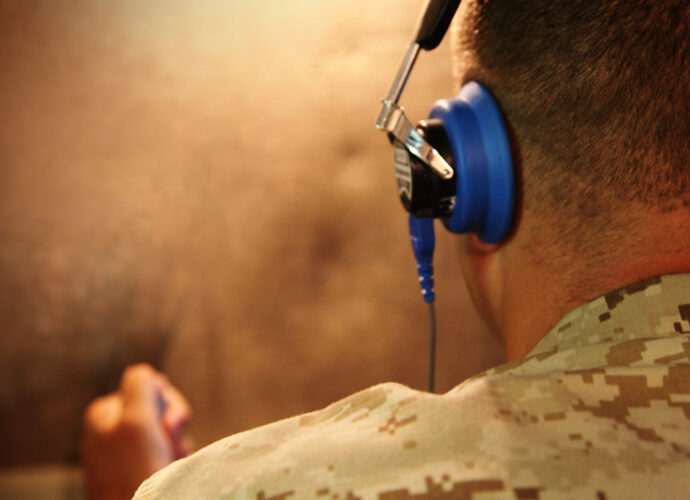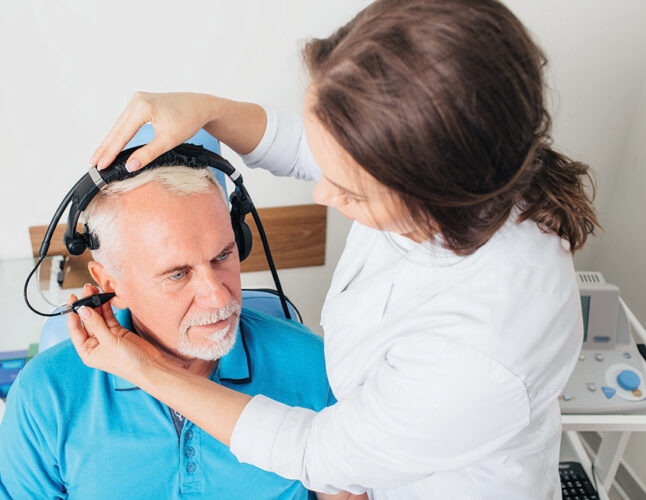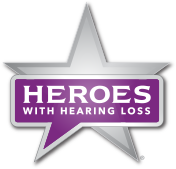A Resource Guide For Veterans With Hearing Loss

“I was given my first hearing aid before I left active duty,” says Bret Weaver, who served in the U.S. Air Force for just over three years as a mechanic working on F-15 jets.1 “I don’t think I ever wore it for the first year or two. They tested me pretty regularly up to my discharge. My hearing continued to worsen after I got out of the military, so they tested me yearly… I think hearing loss risks are downplayed to a degree because hearing loss can be very hard to deal with on an individual basis. It’s not something that another person can see, like losing a limb. People don’t understand the difficulties of using hearing aids, or how your hearing changes daily or hourly depending on the battery life, etc.”
Weaver’s story is incredibly common among both former and active military personnel. After all, tinnitus and hearing loss are two of the top service-connected disabilities for which veterans are compensated in the United States.2 The unique challenges veterans face in addressing hearing-related issues necessitate specialized support and resources.
Understanding Veterans’ Hearing Loss

Whether it’s acoustic trauma during combat or training exercises (particularly those involving gunfire), or long-term exposure from operating machinery, or working on a flightline, veterans often incur hearing loss as a result of their time in service. Tinnitus, characterized by ringing or buzzing in the ears, is also a very common condition among service members – often related to the same kinds of noise or concussive blast exposure. Understanding the distinct nature of these issues within a military environment is crucial in tailoring support and assistance specifically for veterans.
At Heroes With Hearing Loss®, we’re dedicated to helping veterans navigate the impacts of hearing issues and stay connected with what matters most in life. We’ve put together a detailed guide to resources and services available for veterans with hearing loss to help them mitigate the effects of this condition. Here’s a sample of what’s included in the guide:
Services and Resources

- VA Audiology Clinics:
- The Veterans Health Administration (VHA) operates audiology clinics across the country, providing comprehensive hearing services.
- Veterans can locate VA audiology clinics near them by visiting the VA’s official website at: va.gov, navigating to the “health care” section and using the facility locator tool.
- In some cases, veterans who do not live near a VA facility may qualify for care outside the VA from a provider within the community care network. Check for eligibility by visiting the VA community care page (va.gov/resources/eligibility-for-community-care-outside-va/).
- Education and Rehabilitation Programs:
- Veterans Affairs (VA)
The VA offers rehabilitation programs focused on addressing hearing loss-related challenges. - Hearing Center of Excellence
The Hearing Center of Excellence fosters and promotes the prevention, diagnosis, mitigation, treatment, rehabilitation and research of hearing loss and auditory injury. - Heroes With Hearing Loss®
Heroes With Hearing Loss provides lifestyle-focused solutions and information that minimize the impact of hearing loss. The program, sponsored by Hamilton® CapTel®, connects veterans with the people who matter most by providing Captioned Telephone solutions for veterans with hearing loss at no cost, in addition to downloads, blogs and resources aimed at helping mitigate the impacts of hearing loss.
- Veterans Affairs (VA)
- Counseling Services:
- VA provides counseling services and support groups specifically addressing the psychological impact of hearing loss.
- The confidential Veterans Crisis Line is available to all veterans, their families and friends in times of crisis. If you are a veteran, service member, or any person concerned about a veteran, you can connect with professional, caring VA responders over the phone/TTY – dial 988 then press 1, text 838255, or through online chat at VeteransCrisisLine.net/get-help-now/chat
- Non-profit Organizations:
Several non-profit organizations have programs dedicated to supporting veterans with hearing loss. Examples include:- Hearing Health Foundation (HHF)
HHF is the largest non-profit funder of hearing and balance research in the U.S. and is a leader in driving innovative treatments for people with hearing loss, tinnitus and other hearing challenges. - Hearing Loss Association of America (HLAA) Veterans Across America Virtual Chapter
HLAA’s veterans community mission is to provide education, be an advocate for veterans with hearing loss and provide a support system to help veterans return to and adjust to civilian life.
- Hearing Health Foundation (HHF)
For more information about these and other resources and services, including links to websites and contact information, download the complete Guide For Veterans With Hearing Loss and please share it with any veterans you think may find it useful.
1 Bret Weaver, “Veterans Stories,” Hearing Health Foundation hearinghealthfoundation.org/veteran-stories
2 VA Annual Benefits Report, 2023 benefits.va.gov/REPORTS/abr/docs/2023-abr.pdf
 Heroes With Hearing Loss
Heroes With Hearing Loss